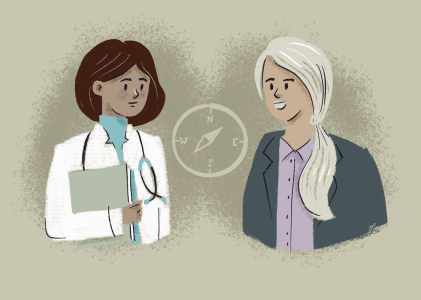Considering a career in mental health but don’t know where to start? Read on to find the best path to reach your goals.
Over 100 million Americans live in an area experiencing a shortage of mental health care providers. With soaring rates of depression, anxiety, drug overdoses and suicide attempts, we need many more people to enter the mental health profession to keep up with demand. If you’re interested in mental health, this may be an excellent time to get training and enter the field.
The question is, which career path is right for you?

The mental health field includes professionals with different degrees and specialties, from doctorates to master’s degrees. The degree you choose will influence such factors as:
- How many years it will take to finish your degree
- How much money that degree will cost
- Where you’ll work
- What kinds of patients you’ll see
- What methods you’ll use to treat them
- How much money you’ll earn
Some people feel driven to attain the highest degree possible, no matter how much time or money it takes. Others prioritize more efficient programs that get them working quickly.
To help you choose the path that fits you best, let’s explore how different career options might fit your interests and goals.
Medicine or Therapy?
One of the broadest distinctions between mental health professionals is whether they use medicine or therapy as their primary method to treat mental conditions.
Psychiatrists and psychiatric nurse practitioners usually treat mental illnesses medically. They have extensive training in medicine and biology and they tend to focus on the medical aspects of diagnosis and treatment.
Psychologists, social workers, professional counselors and therapists generally use psychotherapy and/or behavioral therapy to help patients cope with mental illness, trauma, or personal issues. Their training in human development and behavior guides their therapy practice.
Flexibility or Efficiency?
Psychiatrists and clinical psychologists obtain doctorate degrees, the most extensive training of all mental health professionals. This advanced training allows them the most flexibility in terms of where they can work, what they can do, and what kinds of patients they can see. They can work for an institution or practice independently. They can administer and interpret diagnostic assessments and see patients with severe mental illness.
Psychiatric nurse practitioners working in “full practice” states may achieve similar levels of autonomy to psychiatrists. However, some states require nurse practitioners to work under career-long supervision.
Licensed master’s level social workers, counselors and therapists often can work independently, though they may not be permitted to administer or interpret clinical diagnostic assessments. Conversely, they can start practicing more quickly than other mental health professionals. This efficiency may be especially appealing to people switching from other careers or to people who can’t spend the time and money to pursue extensive training.
If you seek a master’s-level mental health degree, make sure that degree qualifies you to get the job you want. Some training programs offer master’s degrees that do not meet licensing requirements and those programs aren’t always transparent about those limitations. Look at the licensing requirements for the state in which you want to practice and check that your proposed degree meets them.
What about Money?
Salaries can vary wildly depending on where you work and whether you accept insurance. Psychiatrists will generally make more than $200,000 annually, while a licensed professional counselor can make anywhere from $45,000 to more than $100,000. Typically, private practice professionals who require cash payments will make the most money. However, the extra income requires trade-offs. You must be willing to shoulder the risks and stresses of running your own business. Also, you may not be able to serve the people who may need your help the most, such as people who can’t afford to pay out of pocket.
More Information
A mental health career can reward you emotionally and financially. Picking the right career path requires research. The information in this table and on our careers page may give you a good start.
| Title & Degree | Years of Training* | Treatment / Assessment | Salary |
| Psychiatrist (MD or DO) | 12 | Medical treatment and psychotherapy | $200k+ |
| Nurse Practitioner (PMHNP) | 8-10 | Medical treatment and psychotherapy | $100k+ |
| Psychologist (PhD or PsyD, rarely EdD) | 9-12 | Psychotherapy, psychological testing, IQ testing, research | $80k average |
| Licensed Clinical Social Worker (LCSW) | 8 | Group or individual therapy | $60k average |
| Licensed Professional Counselor (LPC-MHSP) | 8 | Group or individual therapy | $50k average |
| Marriage and Family Therapist (MFT) | 8 | Family or couple’s therapy | $50k average |
| Behavior Certified Behavior Analyst (BCBA) | 7 | Help solve behavior-related issues in various environments. Often associated with autism interventions but useful in many contexts. | $60k average |
| Art or Music Therapist (master’s level) | 6 | Use creative media to treat various mental health issues. Work alongside other mental health professionals to assist with the treatment of substance abuse, anxiety, trauma, and cognitive problems. | $50k average |
Next Steps
Because Athena Care offers comprehensive mental health care services, we employ a wide variety of mental health professionals. Please visit our careers page to see if any positions might fit you.

Rachel Swan, MS
Editor
Rachel has a Masters of Science in Clinical Psychology from Vanderbilt University, where she spent 16 years as a Research Analyst in the Psychology and Human Development Department.


